Justice, at its base, means "to be just, fair". Most commonly, however, the meaning of justice is to punish a criminal that has done something wrong in a suitable manner that fits their crime.
Overview
| — Kuzan on justice to Jaguar D. Saul. |
Justice, in this sense, can be served to a criminal in many ways from time in prison to execution. The classic view of how a criminal should 'receive justice' is thought of as "an eye for an eye", which means if they have done something wrong, they deserve a punishment as great as the crime they committed. If a person murders someone, then according to this term, it means they themselves should face the death penalty as a suitable form of justice.
Justice has been used numerous times in the series. The CP9 use this term against Iceburg, and the Marines use this term to catch pirates and criminals. Justice is used in an archetypal pattern often at times (e.g. someone would talk about doing things "In the name of justice"[1] or "ridding the world from evil").
| — Doflamingo on Justice[2] |
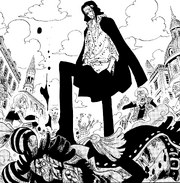
Rob Lucci's "excessive" justice.
Forms of justice are shown in the series. Marines may choose to display signs of Justice based on their own interpretations or opinions of the word "Justice". Some example of different opinion-based ideas on justice include Kuzan who declared he served a "Lazy Justice", Rob Lucci who claimed to serve a "Dark Justice" (闇の正義, Yami no Seigi?)[3] and Smoker who told Tashigi to create her own "personal justice". In the CP9 Mini series, Rob Lucci was seen to have dealt "Excessive Justice" to the Candy Pirates. The extreme nature of his attack against them horrified the citizens that witnessed his strike.[4]
Doflamingo, though a former World Noble and Warlord of the Sea, is not without some opinion in regards to what is and is not justice, but he himself does not seem to care for it. He truly believes that justice is whoever is in charge to deem it so and states that whomever emerges victorious in the Marineford War will have the ultimate say in determining what is and is not justice.[2]
A common theme is that corrupt members of Marines and CP9 often use Justice as vindication for their actions, putting every inhumane thing they have done as a necessary evil to preserve peace to the world. This has often led people (most of them pirates) to react with disgust at their behavior.
Law Enforcers
| — Sengoku in the importance of Marineford to the world. |
To enact "Justice" on the One Piece world, the law enforcement are split between the following groups.
Police
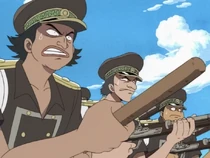
Policemen in Loguetown.
The Police (警察官, Keisatsukan?) are local defensive forces for everyday combat with common criminals. While the Marines maintain a high order of policing in the world, worldwide police officers are employed by the World Government to supervise local areas and arrest unlawful citizens (although locations unaffiliated with the World Government may have their own police force answering to the local ruler, as is the case of Skypiea with the God's Guards and Wano Country with the Mimawarigumi). The duty of a police officer is to maintain law and order, however they only deal with local interests unlike the Marines who maintain a global presence across the world. They leave the task of capturing tough criminals to the Marines, but aid them where needed. So far they have only deployed in small numbers which sharply contrasts the scale of deployment of the Marines.
Genzo is the sheriff of East Blue's Cocoyasi Village, and also doubles as the mayor. Laffitte of the Blackbeard Pirates was said to have been a former policeman, however evidently his "Ultra Violent" ways caused him to be exiled from West Blue. Dressrosa, a kingdom within the New World, has its own police force, known as the Dressrosa Police (DP). Law enforcement also exists underwater, with a Sea Dog being shown to work as a police officer in a small town of Sea Beasts.[5]
Bounty Hunters
- Further information: Bounty Hunter
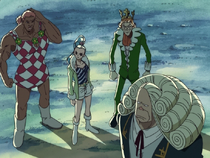
Baroque Works number agents.
Bounty Hunters work for a living to turn in wanted criminals for their bounty reward. Some work alone, such as Jean Ango, while others work in groups like Baroque Works. They operate independently of the World Government's influence, often acting outside the law. All bounty hunters seen so far do not seem to work to uphold justice, but rather for money and fame, and many of them have committed crimes themselves.
Seven Warlords of the Sea
- Further information: Seven Warlords of the Sea
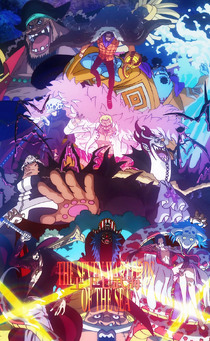
Though not law enforcers as such, the Seven Warlords of the Sea were used to prevent criminals raising up and gaining power. They themselves were "former" criminals, yet many still operate the same criminal activities they did as a pirate though with a few restrictions, which they rarely followed. Due to several members abusing their privileges at the expense of Government-related kingdoms, the Seven Warlords of the Sea organization has been abolished, returning any remaining members to wanted criminals.
Cipher Pol
- Further information: Cipher Pol
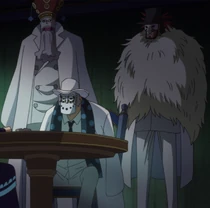
The Cipher Pol are eight units of special government intelligence agencies that also enforce the law. There are two unofficial units, CP9 and CP-0, which exist unknown to the majority of the world, and they have the unique authority to kill any citizen that they deem to be a danger to the world. CP-0 answer directly to the World Nobles.
Marines
- Further information: Marines
The three Marine Admirals.
Marines are the main and largest law enforcement organization of the entire world, and they are widespread throughout the entire sea. Justice is a central point in Marines' activity, to the point where the word "Justice" (正義, Seigi?) is emblazoned on the uniform coats of all commissioned officers.
Pacifistas
- Further information: Pacifista
Pacifistas are cyborgs built on the likeness of former Warlord of the Sea Bartholomew Kuma. They are human weapons developed by the Marines' head scientist, Dr. Vegapunk, with the intent of aiding the Marines in hunting wanted pirates. Pacifistas are incredibly costly to produce, but their cybernetic enhancements make them a formidable challenge to most pirates, including Super Rookies.
Judges

Judges serve an important purpose in the speedy and organized trial of a criminal. The Judge is arguably the most important person to law enforcement as he is the final declaration on a criminal's punishment. On the word of "Guilty" or "Innocent" a criminal can either walk free or be sent to serve for their crimes. Though Marines follow the rule of "Absolute Justice", a Judge may refrain from such extremities. Demonstrations of this have included Jango's pardon, Tom's allowance to have time to build the Sea Train and Baskerville's three heads calling out different verdicts on a criminal (but ultimately declaring them guilty anyway).
Stable Courthouse Judges
These Judges work in explicitly marked courthouses in one single place:
Judicial Ship Judges
These Judges travel on board of Judicial Ships and may judge a person anywhere.
Jurors
Prisons
Prisons are facilities that hold down captured criminals as part of their punishment. The biggest prison in the world is Impel Down, which is reserved for notorious pirates and criminals and located in the Calm Belt, making escape nearly impossible. Local prisons also exist, usually in Marine bases (like Marineford) or as part of a royal castle (like the Ryugu Kingdom), but are smaller in scope and intended for temporary use regarding bigger criminals, who may be eventually transferred to Impel Down.
Justice in Practice
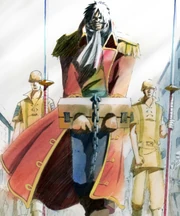
Justice serves to protect the innocent from criminals, no matter how powerful those criminals are.
Several interpretations of the idea of Justice exist within the Marines, and its members are free to adhere to whichever suits them the most, although the World Government tends to encourage the Absolute Justice interpretation.
Absolute Justice
| — Kuzan on Justice in regard to Sakazuki's actions at Ohara |
Absolute Justice (絶対的正義, Zettai-Teki Seigi?) is a philosophy that many Marines follow.[6]
Many Marines follow a strict motto of "Absolute Justice", when it comes to prosecuting those who violate the government's laws. It is a central tenet of Marine doctrine. Supporters of Absolute Justice believe that the eradication of all evil and illegal activities, even if this requires sacrificing innocent lives or engage in immoral acts, since the end justifies the means.
All individuals noted to have done illegal activities or criminal acts are reported to Marine Headquarters and issued bounties, based on the known information about their threat level - regardless of the circumstances.[7][8][9] Anyone connected to criminals, no matter who they are, can be arrested even if they have not done anything and even people related to criminals are to be eliminated.[10][11][12]
It is unknown why the World Government supports Absolute Justice as much as it does nor where the ideals centered around it originate from. However, Vice-Admiral Onigumo best described it as willing to sacrifice anything to defeat what is defined as "evil", though it does ensure that the majority of the world is held under the World Government's dominion effectively giving them absolute control of the world.
Pirates have been especially singled out by the Marines as a major threat to order. They are considered criminals regardless of whether they have committed any crimes other than raising the Jolly Roger and any country caught harboring pirates can have further actions taken against them.[13][14][15] Civilians, too, are targeted by the prohibition against piracy:[16] persons known to have associated with pirates are barred from entering the Marines (though there are notable exceptions), and providing aid or comfort to pirates is a serious crime, especially if they are well-known bounty heads.
Supporters of Absolute Justice are Fleet Admiral Sakazuki, Vice-Admiral Onigumo, and all members of Cipher Pol, while former Fleet Admiral Sengoku is inspired by both Absolute Justice and other forms of Justice.
Upheld Justice
Aside from Absolute Justice, many high-ranking Marines have a personal "Upheld Justice" (掲げる正義, Kakageru Seigi?) in the form of a motto.[17] This sense of justice is often fundamentally tied to their character and reflects heavily in their actions.[18] While some of these mottos are an interpretation of Absolute Justice, other are tied to independent and different sets of ideals; despite favoring Absolute Justice, the World Government allows Marines to follow their own personal interpretation of Justice, as long as it does not cause insubordination.[citation needed]
The following mottos of "Upheld Justice" have been introduced so far.
- Former Admiral Aokiji: "Lazy Justice" (だらけきった正義, Darakekitta Seigi?). This can be seen reflected in his apathetic attitude and unwillingness to act.[19]. His justice was formerly "Burning Justice" (燃え上がる正義, Moeagaru Seigi?), but he came to change his views following the events of Ohara.[18]
- Admiral Kizaru: "Unclear Justice" (どっちつかずの正義, Dotchitsukazu no Seigi?).[18] This can be seen in his carefree attitude and fickle priorities. For example, Kizaru is willing to question pirates in a casual manner while looking for Sentomaru, but immediately goes on the offensive against Basil Hawkins when he does not have the information Kizaru is looking for.[20]
- Fleet Admiral Sakazuki: "Thorough Justice" (徹底的な正義, Tetteitekina Seigi?).[18] This is apparent in his decision to destroy the evacuation ship at Ohara based on the mere possibility that one of the archeologists may have snuck onboard. He believes that "evil" must be eradicated down to its roots.[21]
- Vice Admiral Tsuru: "Cleansing Justice" (清らかなる正義, Kiyorakanaru Seigi?).[22] This fits Tsuru's Devil Fruit, the Woshu Woshu no Mi, which has the power to cleanse evil from the hearts of villains.[23]
- Former Fleet Admiral Sengoku: "Reigning Justice"' (君臨する正義, Kunrinsuru Seigi?).[24] This justice is fitting for Sengoku's former position as the Fleet Admiral in command of the Marines, in which he was known as "The Resourceful General".[25]
- Admiral Fujitora: "Humane Justice" (仁義ある正義, Jingi aru Seigi?). This justice is fitting for Fujitora's moral ideals, caring for innocents and opposing corruption in the Government.[26]
- Vice Admiral Prodi: "Fine Tuned Justice" (メリハリある正義, Merihari aru Seigi?).[27]
Outcome
Success Rates
Generally, most citizens do not have the desire to turn to criminal activity or aid criminals for the fear of punishment by the Marines and may be quick to turn in criminals to avoid association with them as they fear they could be prosecuted for such an act.
Captured criminals also often regret that they ever committed offenses as the punishment they face is often brutal and painful. Since they are targets by the law, the law in turn does not support them when they are in need and when they are in trouble they have only themselves to get though the problem.
Failures
One of the ongoing themes of One Piece is the misapplication of the principle of "justice" by the Marines and other law enforcers. While the Marines wish to maintain law and order by apprehending criminals, the techniques that they (or at least some of the Marines) use can often be no better (or in some cases even worse) than the pirates they seek to wipe out, trampling the rights or needs of civilians in order to pursue its own ends.
The failures so far of this rule have been proven constantly and in many cases led to the opposite happening of what they were intending. For example, an unknown amount of women and children were slaughtered in their child hunt for Roger's child. Rouge, the child's mother, was aware of the child hunt and thus delayed childbirth as long as possible. Garp protected and adopted Ace after his birth as he promised to Roger.[28]
A whole ship of civilians were killed during the Ohara Incident in case one of the Ohara scholars slipped on board. Ironically, Robin was the only scholar who tried to board the ship, but had been prevented because of the civilians' hatred for her. When the ship was destroyed, Kuzan decided to help Robin escape after being disgusted by his fellow Vice-Admiral's actions; another irony in itself as Aokiji intended to end the life of Robin himself up until it happened. This form of justice also brings out the questionable morals in some everyday citizens. With the prospect of gaining instant wealth by selling out Robin to the authorities, Robin encountered many close calls and betrayals while growing up.
Onigumo, a firm believer in absolute justice, ordered a marine under his command to destroy the marine battleship upon which Luffy and Rob Lucci were fighting at Enies Lobby. The marine, disliking the prospect of murdering 1000 of his fellow comrades for the sake of killing 1 pirate, protested the Vice Admiral's orders which resulted in Onigumo shooting the marine in cold blood. The order was then carried out, the result of which was the destruction of the battleship and the marine crew of that ship. However, Luffy escaped the blast with ease, thus making the sacrifice completely pointless.
At times, whenever a huge incident that would become a huge embarrassment to them, the Marines or the World Government would alter the news to make it look less shameful. This was shown when Luffy and his crew defeated Crocodile and his organization in Arabasta. Knowing that public knowledge of a renegade pirate defeating a Warlord of the Sea who abused the privileges given to him by the World Government and saving the country in the process would damage their reputation, they made it seem like Captain Smoker was the one who bested him, despite the fact that he and his marines barely did anything to stop him.
Depending on one's perspective, one could argue that the marines' policy of absolute justice makes them worse than the very evil that they claim to fight. Enies Lobby was known as a place where justice was distributed fairly, but in truth: not one person has ever been found innocent, mainly due to the so-called "jury" consisting of death-row inmates who wish to take as many people with them as possible. And it does not even end there, as the prison called Impel Down is designed to prevent any captive criminals from leaving alive. Even those without a life sentence die in prison from the systematic torture they are sentenced to, something that the jailers find pleasure in doing. The same can be said for the G-5 personnel, marine soldiers who barely follow rules and instead act as violent ruffians by torturing prisoners.
In some cases, the methods and procedures used by the officials can encourage pirates and other criminals to appear, often those trying to seek power and fame via illegal means. Those who are already pirates also often feel empowerment from their own notoriety and gain a sense of freedom from the restraints of normal life having the power to do exactly as they please until the day they are caught or die.
Exclusions
In the end, due to the World Government's "unawareness" of the still existing slavery (despite "abolishing" it over two centuries ago, it still exists due to the World Nobles), any form of Justice that the Marine's claim to have starts to become somewhat hypocritical since slavery and its practices are ultimately the antithesis of justice. The fact that Justice does not apply to the rich, like the spoiled World Nobles, is also a hypocrisy that most Marines and civilians sadly fail to understand.
Another problem with the World Government's concept of "Absolute Justice" is that it effectively doesn't apply to the World Nobles, who are shown to be able to murder innocent people in cold blood without seemingly any repercussions due to their privileged status, which flies in the face of the very term "Absolute" as if it were truly Absolute Justice, then it should at least apply to everyone regardless of whether they are a World Noble or a commoner. Despite their claim of "Absolute Justice" the Government will only send marines to assist countries if they can pay the "Heavenly Tribute".
Most noteworthy of all, is that though the World Government supports "Absolute Justice", they can also be renowned for ignoring justice altogether and the term can sometimes be as questionable as the morals that drive their opinion of 'Justice'. Despite the World Government's view of "Justice", they hypocritically do business with a country run by pirates. Because of all this, the people who follow Absolute Justice can be seen as just as bad, or even worse, than the criminals. Even after completing their goal during the Summit War of Marineford, the Marines refused to give up and continued fighting the pirates.
As a further sign of hypocrisy, the Government was fully willing to recruit powerful and influential criminals (specifically pirates) to become their allies, namely the Seven Warlords of the Sea. The government pardoned all the past crimes committed by these pirates, along with any other criminals who work directly under these pirates, and would allow them to keep committing more crimes to a certain extent, willing to overlook certain things simply to maintain their hold on society's faith in the strength of "justice". When the Government's allied countries gave a consensus of majority to abolish this system, the Government shamelessly severed all ties with the Seven Warlords of the Sea and hunted them down.
Punishments
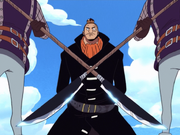
The ultimate price is life itself. Although innocents may see their life end such as was in Noland's case.
Punishment is the final effort of enforcing the rule of "Justice" in the One Piece world. Criminals who attain a bounty can risk bounty hunters chasing them, or in more serious cases Marines. Those in the Grand Line also can risk being taken by kidnapping groups and sold off. Marines who capture a criminal may hold onto them until they are taken to a more suitable prison, like Impel Down. Some will spend a brief moment here, but most will spend the remainder of their lives here, even dying in the extreme nature of Impel Down's levels while the worst criminals are placed on the very low levels of Impel Down essentially they end up being "erased" from historical record. For those who are deemed too much, they are publicly executed and made an example of in order to deter others from doing activities similar to what they did.
The most popular method of execution seen in the One Piece world was used on Gol D. Roger, Mont Blanc Noland, and Portgas D. Ace. It involves placing a criminal on a high execution platform, above the heights of most individuals, usually in a high populated area where the normal citizens can see the criminal be punished. From here everyone can watch as two executioners decapitate the criminal with a long blade.
Another, less spectacular, method is death by a firing squad. It seems to be used on less prominent criminals like Nugire Yainu who was executed under the name of Captain Kuro. Hanging and decapitation by guillotine are also used as means of execution. Both were attempted on Kaido but failed.
In the justice system, it is ironic, yet nonetheless evident that death is also the lightest sentence for a criminal to serve. For the crime of building Gol D. Roger's ship (which is arguably not very criminal) Tom was sentenced to execution at Enies Lobby. The heavier the crime, the more severe the punishment, and the worst criminals may suffer months or years of torture in Impel Down before they die. The level 1 prisoners are however given the option of suicide by jumping into a chute that leads from the Crimson Hell to the Wild Beast's Hell.
Sometimes these punishments have to be enforced even on the law enforcers themselves. Police Officers who abuse their position like Laffitte risk losing their position, and can even be banished from a particular area. In a more serious case, they can even be imprisoned and brought in as a criminal themselves such as the Head Jailer Shiryu.
The most notable problem however is that the innocent can be punished by accident, although the authorities in the One Piece world seem to care little about this. The Just Eleven Jurymen in particular had a reputation for announcing any criminal who entered Enies Lobby as "guilty". The Jurymen themselves were criminals due for their own execution and had sworn to take as many criminals down with them.[29] On top of this, the "3-headed" judge Baskerville would pronounce both verdicts of innocent (left head) and guilty (right head), but ultimate decide (with its middle head) that the criminal was to die anyway. Thus it would seem to make sure no criminal escaped the authorities would turn to killing even the innocents, which diminishes the point of punishing criminals in the first place.
Translation and Dub Issues
Although the original version of the anime, Gol D. Roger was executed by stabbing, in the 4Kids dub Gol. D Roger was "hung" at the "Roguetown" gallows;[30] and in the English-language manga it says the Marines "lopped off his head" (decapitated him). The original Japanese manga never reveals precisely how he was executed (though it depicts the scene) but it remains to be seen whether this will become an important plot point in the future, or if it was simply a way of lessening the visceral impact of the character's death.
Trivia
- Though extreme, the act of punishing those who have anything to do with piracy was also common in the real world, hence why many pirates used nicknames or epithets to protect those around them.[31]
- Killing babies who have criminal parents or a criminal parent is considered a form of eugenics and at the height of the eugenics movement, there were instances where criminals were prevented from having children. This branch of Eugenics is breeding based on behavior, which is often can be a set of ideas criticized even among its supporters especially if is based on social stigma i.e. not all criminals could be considered "evil".
- Children do not always emulate their parents and this is one issue with this particular view on eugenics. This is actually displayed by the Monkey D. family, with Dragon not emulating his father who is a hero of the Marines, whereas Dragon is a revolutionary. While Marines are considered "good guys", Dragon is "the world's worst criminal".
- One consequences is also displayed by Portgas D. Ace. Monkey D. Garp wanted Ace and Luffy to become Marines, however Ace in grew up being hated for his existence as the Son of the Pirate King and this painted his perception of the world. This lead him to learn to follow in his father's footsteps and become a pirate and to support Luffy also becoming a pirate as they were "sons of criminals".
- Relatives of criminals such as Nico Robin, Portgas D. Ace and Monkey D. Luffy, who are hunted based on their relationships alone, are practices of Sippenhaft, which is to blame relatives of the criminal for sharing the same blood as the criminal and judge them guilty of the same crime.
References
- ↑ One Piece Manga and Anime — Vol. 11 Chapter 96 and Episode 45, justice is mentioned.
- ↑ 2.0 2.1 One Piece Manga and Anime — Vol. 57 Chapter 556 (p. 9-11) and Episode 465, Doflamingo expresses his view on changing justice.
- ↑ One Piece Manga and Anime — Vol. 44 Chapter 426 (p. 16) and Episode 308, Rob Lucci declares he his actions are in the name of Dark Justice.
- ↑ One Piece Manga — Vol. 53 Chapter 513, cover story: CP9's Independent Report Vol. 21, Rob Lucci attacks the Candy Pirates captain with great force.
- ↑ One Piece Manga — Vol. 76 Chapter 753, cover story: Solo Journey of Jinbe, Knight of the Sea Vol. 3, The Sea Beast Sheriff debuts.
- ↑ One Piece Manga and Anime — Vol. 11 Chapter 96 (p. 7-9) and Episode 45, Marines under the command of John Giant embrace Absolute Justice.
- ↑ One Piece Manga and Anime — Vol. 11 Chapter 94 and Episode 43, Nezumi reports Monkey D. Luffy to the Marine Headquarters despite defeating Arlong and saving Nami's hometown, purely on the basis of injury to his pride.
- ↑ One Piece Manga and Anime — Vol. 23 Chapter 212 and Episode 127, Smoker and Tashigi get rewarded for the efforts of the Straw Hat Pirates against Crocodile and Baroque Works.
- ↑ One Piece Manga and Anime — Vol. 41 Chapter 398 and Episode 278, Nico Robin is issued with a
 79,000,000 bounty, even though she is just a mere child and survived a great loss, because she can read Poneglyphs.
79,000,000 bounty, even though she is just a mere child and survived a great loss, because she can read Poneglyphs.
- ↑ One Piece Manga and Anime — Vol. 1 Chapter 7 and Episode 3, "They're not gonna let you join if they look into your background."
- ↑ One Piece Manga and Anime — Vol. 1 Chapter 7 and Episode 3, Luffy beats Koby.
- ↑ One Piece Anime — Episode 68, Koby is told by Helmeppo then later Monkey D. Garp to stop mentioning his friendship with Luffy.
- ↑ One Piece Manga and Anime — Vol. 23 Chapter 213 and Episode 128, the Marines demand Arabasta give up any criminals they have.
- ↑ One Piece Manga and Anime — Vol. 18 Chapter 158 and Episode 94, Smoker's reason to arrest Ace.
- ↑ One Piece Manga and Anime — Vol. 23 Chapter 216 and Episode 129, the Straw Hat Pirates give a silent good bye to Vivi to save her from being thought to be linked to them.
- ↑ One Piece Manga and Anime — Vol. 41 Chapter 397 and Episode 278, a ship of Ohara is destroyed on the possibility of a scholar may be on board. However, the truth is that only innocent people and not scholars were on board.
- ↑ Vivre Card - One Piece Visual Dictionary (Card #0357), Kuzan's justice is listed.
- ↑ 18.0 18.1 18.2 18.3 SBS One Piece Manga — Vol. 64 (p. 66), Chapter 629, Oda explains the justice of the three admirals.
- ↑ One Piece Manga and Anime — Vol. 34 Chapter 319 (p. 6) and Episode 227, Aokiji names his motto
- ↑ One Piece Manga and Anime — Vol. 52 Chapter 508 and Episode 401.
- ↑ One Piece Manga and Anime — Vol. 41 Chapter 397 (p. 12) and Episode 278, Akainu is first introduced in the Ohara flashback.
- ↑ Vivre Card - One Piece Visual Dictionary (Card #0262), Information about Tsuru is revealed.
- ↑ SBS One Piece Manga — Vol. 58, Tsuru's fruit revealed and explained.
- ↑ Vivre Card - One Piece Visual Dictionary (Card #0265), Information about Sengoku is revealed.
- ↑ One Piece Manga and Anime — Vol. 57 Chapter 556 (p. 12-13) and Episode 465.
- ↑ Vivre Card - One Piece Visual Dictionary (Card #0830), Information about Issho is revealed.
- ↑ One Piece Anime — Episode 781.
- ↑ One Piece Manga and Anime — Vol. 56 Chapter 551 and Episode 460, Rouge gives birth to Ace and dies soon after, with Garp taking Ace in.
- ↑ One Piece Manga and Anime — Vol. 41 Chapter 390 and Episode 274, the history and state of position of the Jurymen as told by Baskerville.
- ↑ One Piece Anime, 4Kids dub — One Piece introduction "before he was hung from the gallows, these were his final words..."
- ↑ Note about piracy and those related to pirates
| |||||||||||||||
| |||||||||||||||
| |||||||||||||||
| |||||||||||||||
